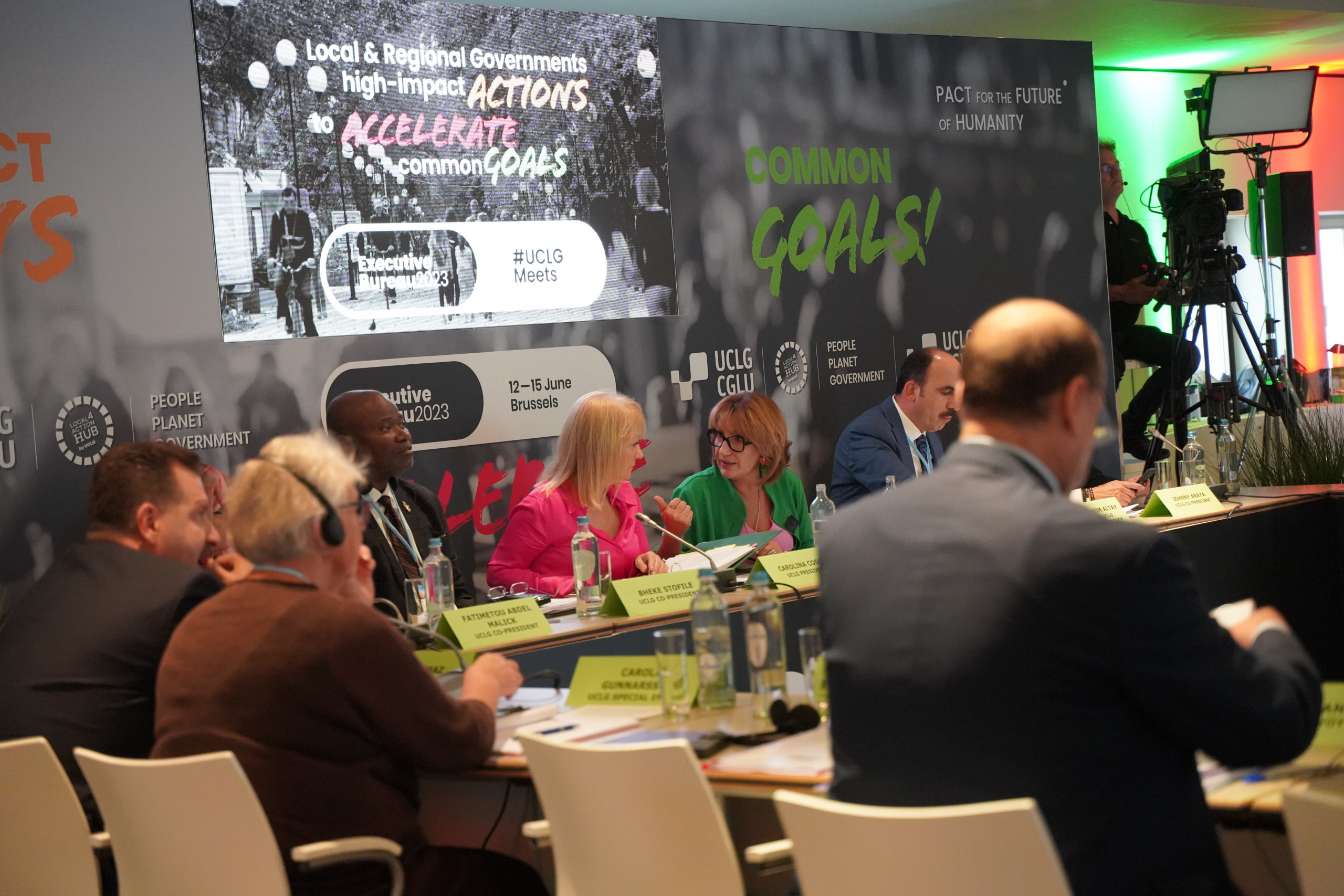The last afternoon of the Brussels Urban Summit was fully dedicated to the fruitful work of the United Cities and Local Government (UCLG) Executive Bureau meeting. Dozens of UCLG members gathered in Brussels to discuss and adopt key documents that would determine the work of the organization in the next months.
Carolina Cosse, mayor of Montevideo and President of UCLG, said in her opening remarks that UCLG’s mandate is clear: now that the Pact for the Future is integrated into the work plan and now it is essential to deploy all three axes and transform commitments into realities.
The special guest of the meeting, Marlene Holzner, head of the Unit for International Partnerships, European Commission, highlighted the special relationship between UCLG and the European Commission (EC), which will be celebrating 10 years of partnership next year. She highlighted the commitment of the EC to this partnership and stressed that “the EC is completely behind the Pact for the Future of Humanity.”
Thembisile Nkadimeng, minister of Cooperative Governance and Traditional Affairs of South Africa, committed to continuing the training for female mayors in Africa and supporting them to make sure they are not just mayors but can also “potentially become presidents in future”.
The Executive Bureau had the opportunity to listen to and adopt the reports of the Committee on Statutory Affairs as well as the report of the Financial Management Committee.
With the adoption of the Pact for the Future of Humanity, there was a shift in the work areas, and subsequently, the names of the UCLG Policy Councils had to be changed to reflect the new priorities and pillars of the Pact. At the Executive Bureau meeting, the new names for the Policy Councils were adopted as follows:
- Right to the City and Inclusive Territories would become Right to the City: Reclaiming the Commons.
- Opportunities for All, Culture and City Diplomacy: Keys to Sustainable Development and Peace would become Opportunities for All: Redefining Finance and Economies for Equality.
- Territorial Multilevel Governance and Sustainable Financing would become Multilevel Governance: Regaining Trust.
- Safer, Resilient and Sustainable Cities, Capable of Facing Crisis would become Resilient and Regenerative Territories: Renaturing.
- Implementation of the New Urban Agenda would become Local Multilateralism and City Diplomacy: Linking the Local to the Global.
During the meeting, the key topics and priorities were listed, among them are migration and the implementation of the Lampedusa charter, human and digital rights, universal health coverage, feminist municipal movement with care at the centre of activities and culture as the motor of the movement, water, proximities, ensuring food systems, Voluntary National Reviews and Voluntary Local Reviews, and participatory democracy.
The session highlighted that the Pact for the Future is not only a revolution of what the network is bringing but also a revolution for the kind of policies members need to work on with each other.
The Executive Bureau meeting also featured the intervention made by partners, including the United Nations Population Fund, UN-Habitat and the Coalition for the UN WE NEED, UN OHCHR, and Cities Alliance. The Media for Cities debate with prominent journalists also took place as part of the high-impact partnership segment of the meeting.
Anne Hidalgo, mayor of Paris, who is also an ambassador of climate questions, raised the increasing frequency of catastrophes. She also spotlighted the issue of land and stressed that “our cities are too artificial” and that “we see the negative impact of this when there is a lot of rain”. Finally, another key concern raised by Hidalgo was the lack of access to funding for local authorities.
Finally, the Executive Bureau meeting has identified continued partnerships with international bodies as key to the development, which will, in turn, become a push for people, local democracy and human rights agenda. As the final message and food for thought, Emilia Saiz, Secretary General of UCLG, has stressed: “We need to acknowledge local and regional governments as the government sphere defending and advancing democracy.”

